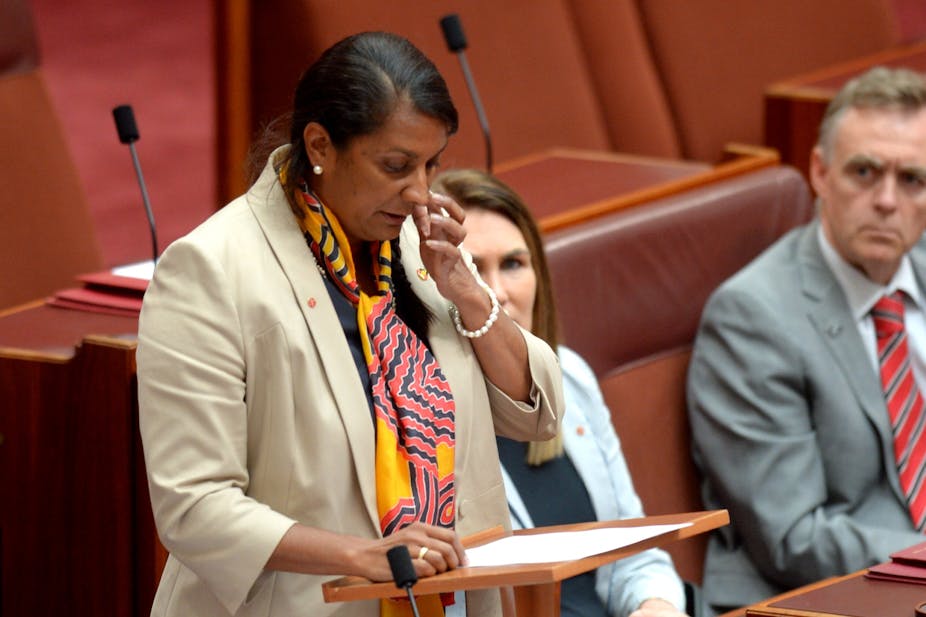When Frances Abbott’s private scholarship award was “exposed”, when poetry professor Barry Spurr was outed for his inflammatory emails and when Senator Nova Peris was devastated by the leaking of her private emails, a media frenzy ensued about their behaviour and character. But less was said about how the information was obtained.
Every day we can read innumerable stories about the internet, published on the internet. Rather than portraying it as a medium that makes our lives better, the stories frequently and depressingly trumpet our abuse and misuse of the internet. But let’s backtrack for a bit.
Thanks to Tim Berners-Lee in August 1991, we were suddenly presented with the World Wide Web. It took off spectacularly. As far as society’s ability to assimilate new developments is concerned, 1991 is not that long ago. We haven’t had much time to learn how drive this amazing cyber vehicle, so cyber accidents are common: online head-ons, rear-enders, side-swipes and, more ominously, hit-and-runs.
We’re still learning to use cars safely
Many parallels can be drawn between society’s adoption of the internet and the motor vehicle. We’ve been driving cars for around five or six generations, but we still kill and maim each other in them every day. While this, at worst, indicates that we might be slow learners, it also shows how long it takes society to adapt to a new technology and normalise its use, if ever.
Information technology development, especially online innovation, is possibly the fastest-moving social phenomenon humans have had to contend with. But our human foibles will not allow society to realise the full potential of being online any time soon. Six generations later, it is still doubtful whether humans are competent enough to drive cars safely. That the vehicle industry is well-advanced in developing self-drive cars suggests we cannot be trusted behind the wheel.
The extraordinary pace of development of the internet, which is fast becoming the Internet of Things (the IOT – only one more syllable to IDIOT), seems to have knocked our integrity and moral and ethical judgement askew. As a society, we do not seem to know what is right or wrong online.
We have trouble establishing behavioural norms as we have done all our lives in almost every other field. Although we still cherish our privacy in a hard-copy kind of way, we are happy as individuals, organisations and governments to stretch the boundaries of acceptable online behaviour. We willingly sacrifice our own (and others’) privacy for functionality, connectivity and the right to have a say on any subject.
Moral and ethical compasses go haywire online
In our “real” lives of physical, face-to-face engagement with other people, we are conditioned by long-held societal norms and values to behave with politeness and mutual respect, at least on initial contact. Online we seem to smash our moral compasses, put on our ugly faces and trammel the dignity and rights of all and sundry. We morph into trolls, bullies, bigots, vigilantes and morons – and that is without adding alcohol or other stimulants.

This online psychosis, which attests to the reality that we haven’t yet earned our internet L-plates, has been thrown into stark relief by the three incidents mentioned above.
The first was the hacking and subsequent guilty plea to unauthorised access by 21-year-old Freya Newman who, with the help of New Matilda, “exposed” Frances Abbott’s scholarship award by a private company. The second was the exposure of emails sent by Spurr. The third was the publication of Peris’ personal emails, which led her to make an impassioned statement in parliament.
Do social rules and laws not apply?
These incidents have kindled a huge amount of social and other media comment. Many commentators supported Newman’s actions as being in “the public interest” as she tried to hack down (pun intended) the tall-poppy figure of Frances Abbott and, by association, her father, prime minister Tony Abbott. Likewise, Spurr was considered to be justly outed given his role in reviewing the national education curriculum.
The social media verdict is still out on Peris, but some think she has some explaining to do.
But are Abbott, Spurr and Peris guilty as charged or are they victims? Is the leaking of their personal details and missives an omen of an Orwellian future for our online existence? It is certainly a sign of how nasty and polarised the political game has become.

It is not my intent to argue the moral case of these three, but to question whether trust has become a serious casualty of our umbilical connection to the internet. We don’t yet know how Spurr’s and Peris’s emails were obtained: were their accounts hacked too, or were they the victims of a catastrophic failure of personal trust? In Abbott’s case, it is clear that Newman illegally accessed a company’s IT network, exposing more than 500 other students’ details, to find supposedly incriminating “evidence” about her scholarship.
Despite the claims of public interest, one trait that stands out about these “leaks” is their vindictive motive. Many social media commentators claim that Newman is merely a whistleblower exposing fraud and corruption, despite her guilty plea and apology to Frances Abbott. She clearly realises that a contrite defendant gets less time than an unrepentant one.
Fortunately, I’m sure there are many people who would not choose Newman as their paladin charged with protecting our morals and virtues.
A crime is a crime in the ‘real’ and internet worlds
The act of accessing an IT network without authority is a crime in Australia. Those who believe it is OK in the public interest might ask themselves if it would be OK for a thief to break into someone’s house to steal their personal correspondence.
There is no difference – just because it is done online, where there is no embarrassing or risky physical and personal contact, doesn’t make it any less repugnant. It is quite simply theft.
It was refreshing to see how American actress Jennifer Lawrence dealt with the recent theft and exposure of her online nude photos:
Just because I’m a public figure, just because I’m an actress, does not mean that I asked for this. It does not mean that it comes with the territory. It’s my body and it should be my choice, and the fact that it is not my choice is absolutely disgusting. I can’t believe that we even live in that kind of world … It is not a scandal. It is a sex crime, it is a sexual violation.
Likewise, Abbott’s personal information was exposed by a criminal act. Her privacy as well as Spurr’s and Peris’ has been violated to create a scandal. It seems the internet has become the tool of choice for the jealous and zealous to better engage in Australia’s most unfortunate cultural pursuit of felling tall poppies.
As many cry out for law enforcement, intelligence and security agencies to be subjected to even stronger regulation and oversight as they carry out their legislated duties, we need to think very carefully about whether or not we want to give unconditional licence to so-called whistleblowers and their media collaborators to become investigator, prosecutor, judge, jury and executioner. We will learn which way the court falls on this question when Newman is sentenced on November 25.
We need to tread cautiously to avoid feeding oxygen to vigilantes who would make George Orwell proud. Who knows? You might be next.

